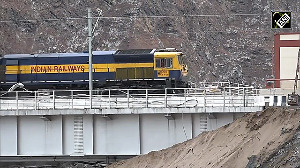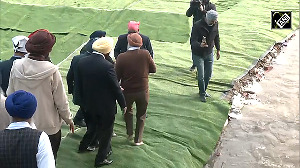Iraq's senior Shia cleric and the spiritual rallying point for millions of Shias across the world has maintained a dignified silence as US troops take control of the holy city of Najaf, home to a theological school and the top Shia clergy.
Earlier, both -- the Iraqi regime and the Bush administration -- had claimed to have the backing of Grand Ayatollah Ali Sistani.
His supporters here in southern Iraq and Kuwait, however, have made it clear that Sistani had issued no fatwa in either party's favour and had let it be known that he would prefer to see his supporters not take sides in the current conflict.
Shias are the majority community in oil rich Iran and Iraq and a significant minority further south in Saudi Arabia.
Some 50 miles from Najaf is the still holier city of Kerbala, which marks the site of the martyrdom of Imam Hussein, the grandson of the Prophet.
Najaf, 100 miles south of Baghdad, houses the tomb of Imam Hussein's father, Imam Ali, who was also the cousin and son-in-law of the Prophet.
More than 300,000 residents of the Basra region, including Najaf and Kerbala, were slaughtered on Saddam's orders in 1991 when the US stood aside after exhorting them to "rise up" against the Iraqi president.
This time the community has barricaded itself behind closed doors, preferring to take the the Ayatollah's advice.
"According to the information we received, there is no fatwa referring to Americans or Iraq, but he has asked people to remain neutral and not get involved," said a London-based spokesman for the Ayatollah.
Before the statement from the London representative, US Brigadier General Vincent Brooks had briefed the media about the Ayatollah's 'latest edict', describing it as a 'very significant turning point and another indicator that the Iraqi regime is approaching its end.'
Brooks had also declared that Iraqi forces had taken up positions inside Najaf's Ali Mosque, one of the world's most important Shiite shrines, and were firing on coalition troops.
"The regime's use of the Ali Mosque for military purposes is just the latest detestable example of the regime's strategy of deliberately putting sacred sites in danger," he had said.
The coalition has designated all holy sites in Iraq as "no target" zones, only to be fired upon in self-defence. When coalition troops entering Najaf on Wednesday were fired upon by fidayeen fighters loyal to Saddam, they chose not to return the fire, Brooks said.
A local US commander defused a potentially explosive situation when he and his men were surrounded by a milling crowd in the city centre, according to eye witnesses. By laying his weapons on the ground he demonstrated that the coalition did not intend to harm either the Ayatollah or any of the holy sites.
A spokesman for US forces in the city said there were negotiations with Sistani about how to govern Najaf in the absence of pro-Saddam forces.
"I think he realised we really are here to help Iraqi people," the spokesman said, adding that the coaltion had destroyed a statue of Saddam Hussein on a rearing horse with a sword in his right hand in the center of the city.
Rediff.com Senior Editor Shyam Bhatia is the co-author of Saddam's Bomb, on Iraq's search for nuclear weapons.






 © 2024 Rediff.com -
© 2024 Rediff.com -